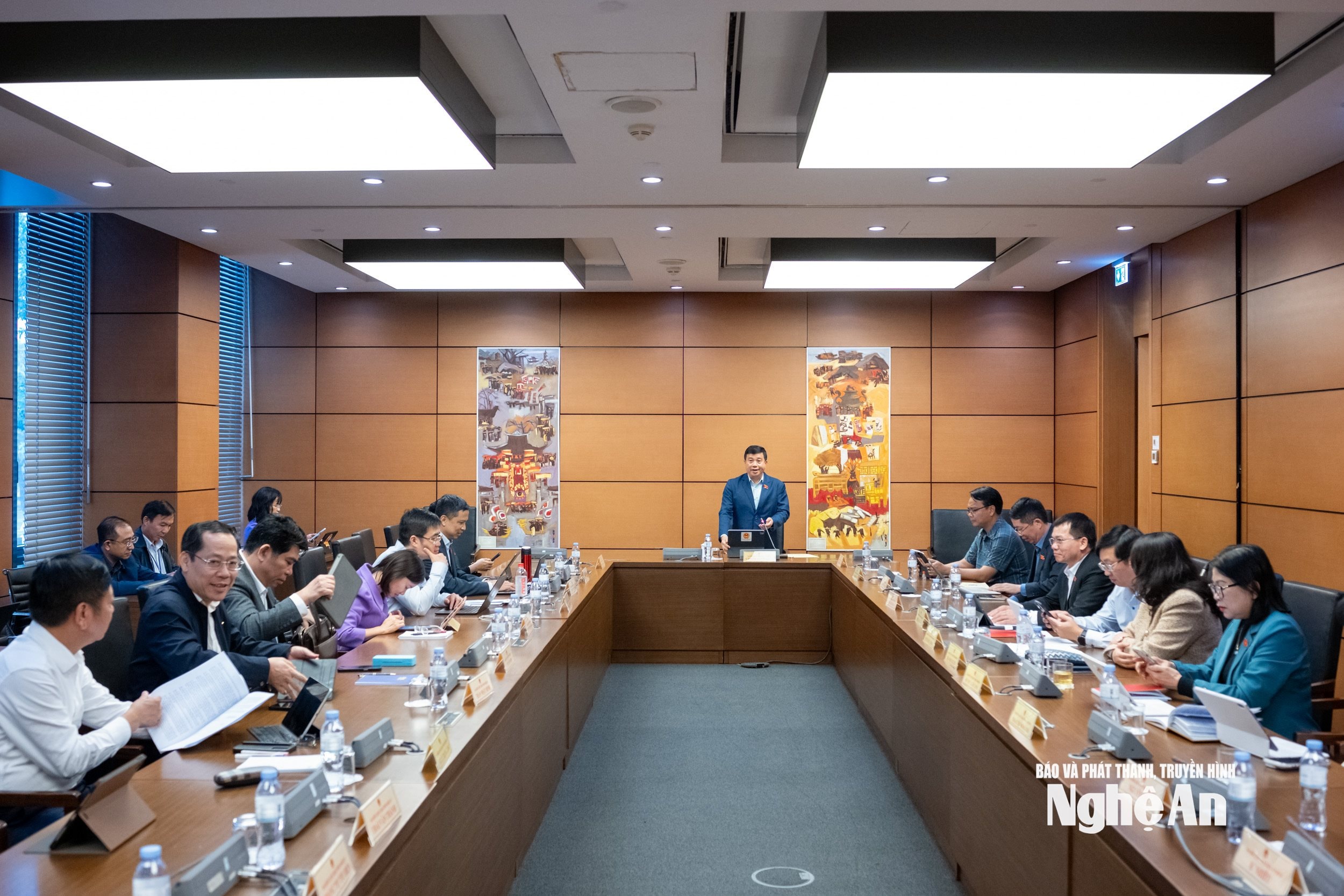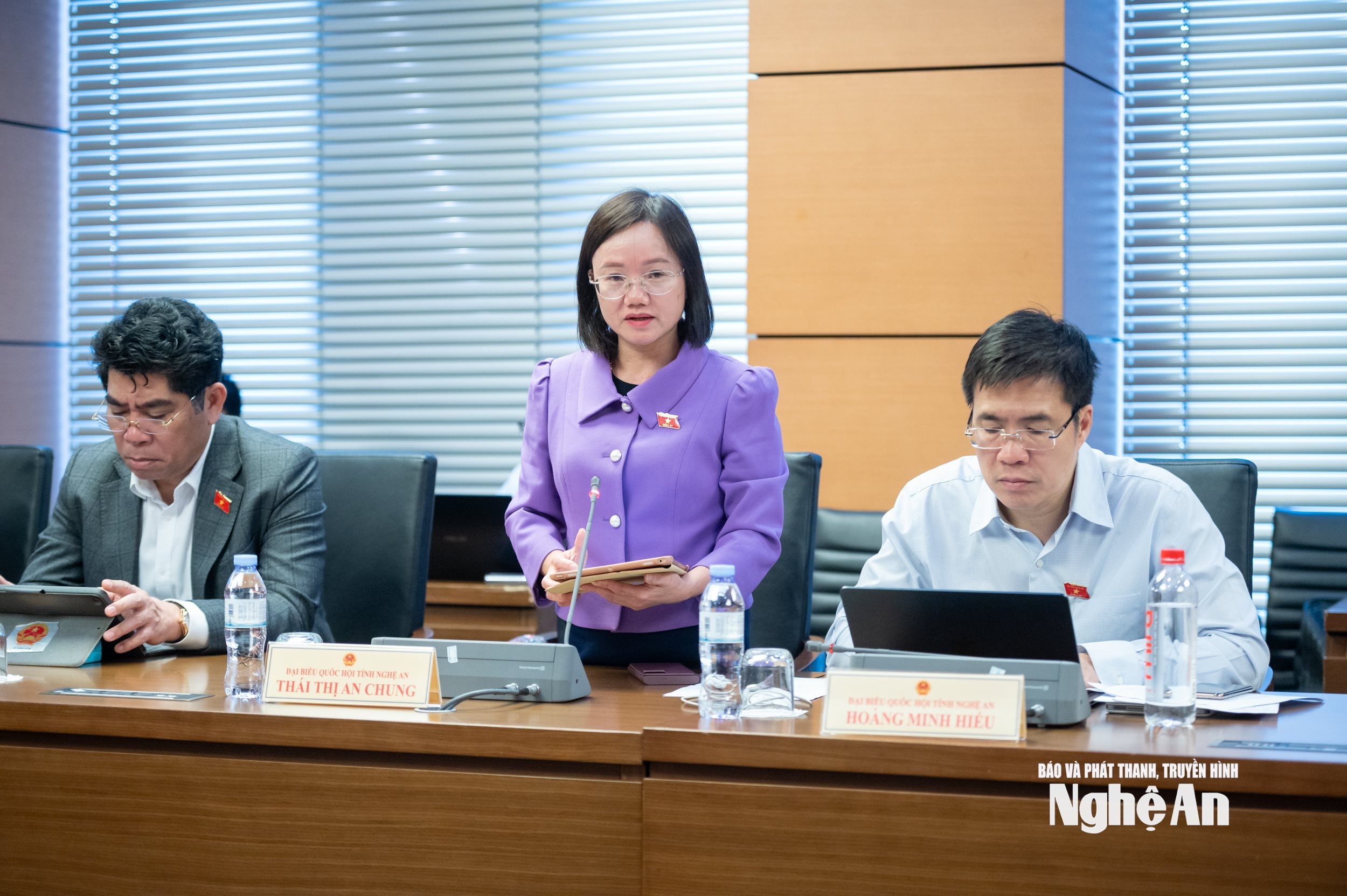National Assembly delegates from Nghe An province proposed three solutions to develop green and sustainable e-commerce.
Giving comments at the discussion session on the draft Law on E-commerce, delegate Thai Thi An Chung emphasized the need to develop a national set of criteria on "Green E-commerce", implement tax incentives, green credit and promote reverse logistics to develop sustainable e-commerce.

On the afternoon of November 3, the National Assembly discussed in groups: the draft Law amending and supplementing a number of articles of the Law on Statistics; the draft Law amending and supplementing a number of articles of the Law on Prices; and the draft Law on E-commerce.
Speaking at the discussion on the draft Law on E-commerce, delegate Thai Thi An Chung - Member of the Provincial Party Executive Committee, Deputy Head of the Nghe An National Assembly Delegation gave comments on the policy of developing green and sustainable e-commerce.
Citing report No. 199 of the Ministry of Industry and Trade, the delegate said that the scale of Vietnam's e-commerce market in 2024 has reached 25 billion USD, an increase of 20% compared to 2023 and contributing nearly 10% of total revenue from consumer goods and services nationwide.
However, the rapid development of e-commerce also entails a large amount of packaging waste and emissions from transportation, while the report does not have specific statistics on the level of environmental impact in Vietnam.
“However, as consumers, we can easily see that waste from online shopping packages is 3-4 times more than from traditional shopping,” the delegate commented.

She appreciated the Drafting Committee for including the content of green and sustainable e-commerce development in the Draft Law, which encourages businesses to reduce waste in production and transportation; platforms to apply "green" and "sustainable" labels to raise consumer awareness and propose financial support mechanisms for environmentally friendly solutions, and assign the Provincial People's Committee to support the development of green logistics and smart warehouses.
However, to put these regulations into practice, delegates said that the above regulations still have some limitations, especially in terms of orientation, mainly stopping at the "encouraging" level.
In a context where the initial costs for green solutions such as biodegradable packaging and renewable energy are often higher, a simple "incentive" policy will not be enough to motivate businesses to prioritize change, especially small and medium-sized enterprises.
Regulations on "green label" are also general, lacking a clear legal basis. The draft has not clarified the criteria for a product or service to be labeled "green"? Which agency is responsible for appraisal? Without a set of standard criteria and monitoring mechanism, we can easily face the situation where businesses label themselves green for advertising without actually complying with environmental standards, causing confusion for consumers.
The draft law also does not clearly mention the circular economic model, especially reverse logistics. E-commerce creates a huge amount of packaging waste. Sustainable development is not only about using green materials (input) but also about solving the problem of collecting, recycling, and reusing packaging and products after use (output). This is a shortcoming that needs to be supplemented.
From there, delegate Thai Thi An Chung proposed that the Drafting Committee supplement and revise the above regulations in 3 directions:
Firstly, supplementing regulations on developing a set of criteria and a mechanism for recognizing "green e-commerce" by adding regulations assigning the Government or the Ministry of Industry and Trade to preside over and coordinate with the Ministry of Natural Resources and Environment with the task of: "Developing and promulgating a set of national criteria on "green e-commerce enterprises", "green products", "green logistics services"; clearly defining the process, authority to recognize and monitor the use of these brands on e-commerce platforms".
“This aims to standardize standards, create transparency for the market, protect consumers from "greenwashing" and create a basis for implementing support policies for the right subjects,” said the delegate of Nghe An delegation.
Next, according to Ms. Thai Thi An Chung, it is necessary to concretize the "support mechanisms" into real incentive policies. Instead of just "support from financial sources", she proposed to amend in the direction: "The State has preferential policies on tax, green credit, technical support and trade promotion for organizations and enterprises recognized as meeting the national criteria on green e-commerce". When economic benefits (incentives) are linked to achieving standards (certification), enterprises will have stronger motivation to invest in green transformation.
Finally, the delegate from Nghe An also proposed adding regulations to promote circular economy and reverse logistics. "Encourage and have policies to support e-commerce platforms, sellers and logistics enterprises to design and operate reverse logistics systems to collect, classify, reuse and recycle packaging and products after use in e-commerce transactions," said the delegate from Nghe An.
Also in the discussion on the draft Law on E-commerce, delegate Thai Thi An Chung expressed her opinion on the regulation of "automatic censorship" of content of goods and services on e-commerce platforms.
Delegates said that requiring "automatic censorship" would increase compliance costs, causing difficulties for small and medium-sized enterprises due to having to invest in additional technology systems and specialized software.
She proposed removing the phrase “automatically” and instead regulating it in a more flexible way, allowing businesses to proactively choose appropriate censorship tools and measures, as long as they ensure that the displayed content complies with the law.
At the same time, delegates noted that the provisions on joint liability in the draft need to be reviewed to be consistent with the Civil Code and the Law on Consumer Rights Protection, avoiding overlap and contradictions during implementation.
Particularly for multi-service integration platforms, she suggested carefully checking compatibility with the Competition Law, especially regulations related to abuse of dominant position or unfair competition restrictions.
